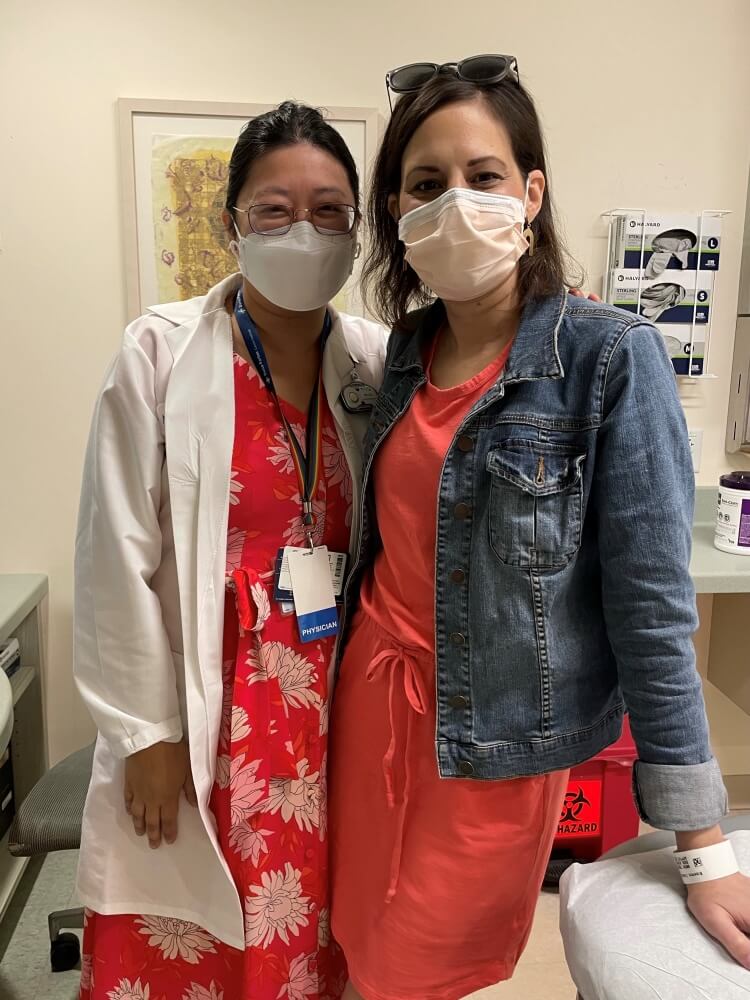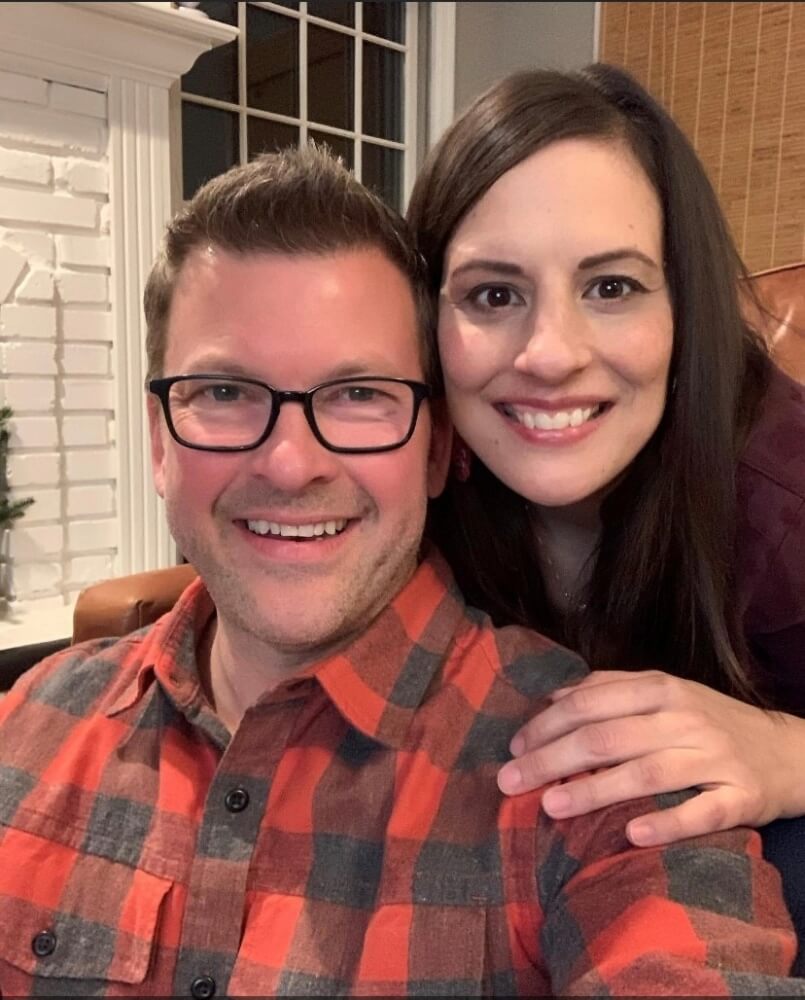Lianne Kraemer describes two breast cancer diagnoses before age 40 — including metastatic breast cancer (MBC) that had spread to her brain — as “slamming into one brick wall, getting back on life’s highway, and then slamming into another.” Now, as she continues navigating her way with the disease, Kraemer is helping those traveling a similar path.
Kraemer uses her experiences and long-term survivorship to provide guidance and hope to others living with the incurable cancer, including how to find the best clinical team. She found hers approximately 1,000 miles from her Chicago home in the Program for Patients with Breast Cancer Brain Metastases at Dana-Farber Brigham Cancer Center. Her care team there, led by medical oncologist Nancy Lin, MD, and radiation oncologist Ayal Aizer, MD, MHS, collaborates to provide Kraemer with access to the latest treatment options and clinical trials suited to her individual cancer.
“Receiving a diagnosis of brain metastases is like having a second cancer,” says Kraemer. “It requires additional specialists focused on your neurological issues, as well as a second, smaller set of drugs that can work in your brain. Not all drugs that work for MBC in the body work in the brain. I come to Boston each eight weeks with the highest level of confidence, and my hope is to pass that along.”

Twinge and a tingle
Armed with a master’s degree in health sciences, Kraemer was thriving in her career as a pediatric speech therapist when she felt a twinge of pain in her left breast while showering on Christmas Eve, 2013. A self-examination revealed a tiny bump that she could barely see or feel.
“I really wasn’t worried,” she recalls. “There were no documented cases of cancer on either side of my family, and I had always heard that breast cancer didn’t hurt. At 37, it wasn’t even on my radar.”
When the pain persisted for two weeks, Kraemer called her gynecologist — and eventually was referred to a breast surgeon who recommended a mammogram. This, along with an ultrasound and biopsy, revealed she had stage II breast cancer that had progressed into her lymph nodes; after undergoing fertility preservation treatment in February 2014, Kraemer underwent a double mastectomy, chemotherapy, reconstruction, and then radiation in Chicago.
“It was a tough couple years, and I had to leave my job to recover from treatment, but they saved my desk for me,” she says. “Then in June 2016, when I was getting ready to go back, I started having the slightest tingle on the right side of my face. It began so suddenly, it felt like someone had switched on a light switch.”
Her oncologist recommended a brain scan, which revealed 12 brain metastases. Because the tumors were limited to Kraemer’s brain, doctors initially recommended whole-brain radiation. Then a clinical trial was found for which she qualified; she joined it that July.
“The trial gave me hope, but the healthcare professional in me wanted to be sure skipping radiation was the right choice,” says Kraemer. “My local oncologist did not specialize in brain metastases, and I needed to consult with somebody who was an expert. When I started researching who was leading studies, one name kept coming up: Nancy Lin, MD.”

The right move
Traveling to Boston in August 2016, Kraemer had her first meeting with Lin. She assured her that joining the trial was a very reasonable option to consider.
Led by Lin’s Dana-Farber colleague Sara Tolaney, MD, MPH, the trial was testing abemaciclib — a type of targeted oral medication called a CDK4/6 inhibitor — in patients whose cancer had spread to the brain. The medication had shown promise in patients with estrogen receptor positive metastatic breast cancer, and there was preliminary evidence that the drug could cross into the brain. As a safety measure, frequent scans allowed patients to come off the study if the treatment was not working.
“Dr. Lin had innate knowledge of everything I had questions about, and treated me with compassion and respect,” Kraemer recalls. “I left that appointment feeling like I could breathe again, and that Dr. Lin and I were already working in tandem.”
In a way they were, as Lin agreed to be a consultant to Kraemer’s local oncologist. At first the trial kept Kraemer’s cancer contained, but she was forced to leave it in early 2017 when her brain metastases began to grow. It was then, while searching for new treatment options, that she made a bold decision.
“No matter how far away she was, I wanted Dr. Lin to be my primary oncologist,” Kraemer says.
Kraemer insists it was a lifesaving move. Lin found a new clinical trial, created at Dana-Farber, that Kraemer could join. She flew to Boston each three weeks for treatment, and when her brain metastases began to grow again, Lin found another trial — and then another.

Ever forward
Today, six years after her initial MBC brain metastases diagnosis, Kraemer has far exceeded the average life expectancy for the disease. She comes each eight weeks for scans and treatment decisions with Lin and Aizer, who consult with her Chicago-based neuro-oncologists and other members of her clinical team.
And just as she once did as a speech therapist — helping children learn to eat, speak, and breathe independently — Kraemer is enabling other MBC survivors to forge past brick walls. She serves on multiple advocacy committees, speaks at symposiums devoted to the disease, and helped create a website for patients focused on MBC brain metastases education and access to clinical trials. Lin and Aizer serve on the site’s advisory board.
“Lianne is fully aware of what she is up against, and yet continues moving forward, despite obstacles and limitations from her breast cancer,” says Lin, director of the MBC program. “Like everyone, she has good days and bad days, but I am always blown away by her determination to advocate for herself and others living with brain metastases. Lianne has a heart of gold. She is such an inspiration to me, and her work is reaching people in need of hope, information, and support.”

Lianne is a glowing inspiration to me… an amazing journey through this, always positive in the hardest of times.